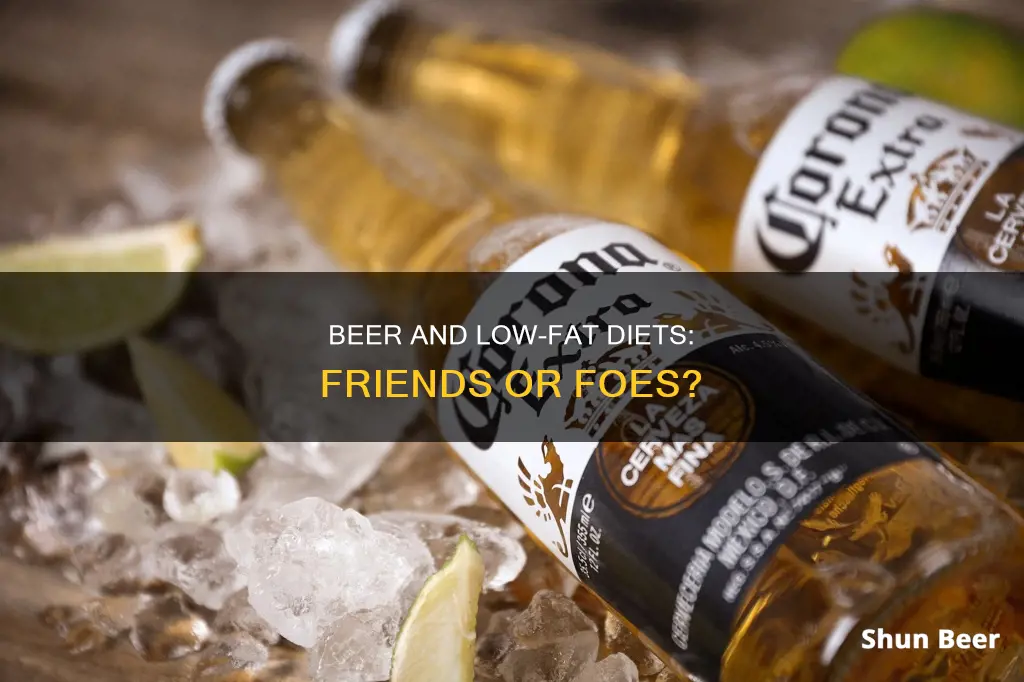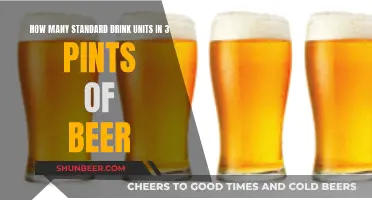
Beer is a popular alcoholic drink that is enjoyed by many, but does it have a place in a low-fat diet? Beer is often associated with the infamous beer belly, but is it the beer itself that causes this weight gain, or are there other factors at play?
The answer is complex and depends on various factors, including the quantity and quality of food consumed with the beer, the type of beer, and individual factors such as genetics, gender, and age. Beer does contain calories, and a typical beer has around 150 calories. Alcohol also reduces our inhibitions and stimulates our appetite, often leading to the consumption of calorie-rich foods. Additionally, the body prioritizes processing alcohol over burning fat, which can further contribute to weight gain.
However, some studies suggest that moderate beer consumption may not necessarily lead to weight gain, especially when coupled with a healthy diet and regular exercise. Light beers, low-alcohol beers, and low-carb beers are also options for those looking to reduce their calorie intake.
So, can you drink beer on a low-fat diet? The answer is that it depends. While beer may not be the main culprit behind the beer belly, it can contribute to weight gain, especially when consumed in excess. Therefore, drinking in moderation, opting for lower-calorie options, and maintaining a healthy lifestyle are key to enjoying beer while maintaining a low-fat diet.
| Characteristics | Values |
|---|---|
| Calories in beer | 150-153 calories per beer |
| Calories in light beer | 100-103 calories per beer |
| Calories in craft beer | 171 calories per beer |
| Calories in food consumed with beer | High |
| Alcohol's effect on body's fat-burning ability | Alcohol decreases fat burn in the belly |
| Alcohol's effect on food consumed | Alcohol increases appetite |
| Alcohol's effect on metabolism | Alcohol temporarily stops the body from burning fat |
| Alcohol's effect on blood pressure and cholesterol | Alcohol increases blood pressure and cholesterol levels |
| Alcohol's effect on bone health | Alcohol negatively affects bone health |
| Alcohol's effect on hydration | Alcohol is a diuretic |

Beer and weight gain
There are a few reasons why beer may contribute to weight gain, particularly around the belly:
- It increases your calorie intake, as beer contains a similar number of calories per gram as soft drinks.
- It may prevent fat burning, as your body prioritises breaking down alcohol over other sources of fuel, including stored fat.
- It contains phytoestrogens, plant compounds found in hops that can mimic the female sex hormone oestrogen and may increase the risk of storing belly fat in men.
- It can increase your appetite, causing you to eat more.
- It's often drunk with calorie-rich foods like pizza and chicken wings, which add to the calorie intake.
However, moderate drinking of one beer per day or less is not typically linked with significant weight gain. It's when you drink larger amounts or binge drink regularly that the risk of weight gain and serious health problems becomes much higher.
To minimise the risk of weight gain, it's important to keep your alcohol intake within recommended limits and lead a healthy, active lifestyle. Some specific strategies to enjoy beer without gaining weight include:
- Avoiding binge drinking and binge eating.
- Opting for healthier snacks like vegetables and protein-rich foods instead of fatty options.
- Including non-alcoholic or alcohol-free beers in your rotation, as these have minimal to no alcohol and fewer calories.
- Choosing light beers, which have fewer calories and carbohydrates.
- Drinking water before, during, and after consuming alcohol to stay hydrated and reduce the impact of alcohol-induced sluggishness.
- Increasing your physical activity, particularly cardio exercises like running, swimming, and cycling, as well as high-intensity interval training (HIIT) and heavy resistance training.
Exploring Alcohol Culture: Beer Drinking in Israel
You may want to see also

Beer and exercise
However, beer can be incorporated into a healthy lifestyle if consumed in moderation. According to a 2014 study, moderate drinking is associated with a lower risk of cardiovascular disease. This equates to no more than one to two drinks per day for men and no more than one drink per day for women. It is also important to stay hydrated by drinking water before, during, and after consuming alcohol.
To fit beer into a healthy diet and exercise regimen, it is crucial to be mindful of the calories in each drink and make adjustments accordingly. Switching to light beers or low-calorie craft beers can help reduce caloric intake without sacrificing enjoyment. Additionally, pairing beer with low-calorie, protein-rich snacks can slow the body's absorption of alcohol and reduce the risk of overindulgence.
Exercising regularly can also help offset the impact of beer consumption. Aerobic exercises like running, swimming, cycling, and tennis are particularly effective in reducing body fat. High-intensity interval training (HIIT) and heavy resistance training can increase oxygen intake and enhance the body's ability to burn calories even at rest.
In conclusion, while beer and exercise may seem like contradictory pursuits, they can coexist with careful planning and moderation. By making conscious choices about the type and amount of beer consumed, staying hydrated, and engaging in regular physical activity, individuals can enjoy the occasional beer without compromising their fitness goals.
Beer and Tramadol: A Risky Mix?
You may want to see also

Beer and food
Firstly, it's important to understand that beer itself does not contain fat. However, it is relatively high in calories, with a typical beer containing around 150 calories. Craft beers can have even more, sometimes exceeding 200 calories per serving. When consumed in excess, these calories can contribute to weight gain, especially when paired with calorie-rich foods. This is because alcohol affects the body's ability to metabolise calories, leading to an increased storage of fat. Additionally, alcohol reduces inhibitions and stimulates appetite, often resulting in overeating.
To enjoy beer while maintaining a low-fat diet, several strategies can be employed. Firstly, it is recommended to switch to light beers, which have significantly fewer calories and carbohydrates than regular beers. This simple change can help reduce your overall caloric intake without sacrificing the enjoyment of drinking beer. Additionally, it is important to be mindful of the amount of alcohol consumed and to stay within the guidelines for moderate drinking, which is no more than one to two drinks per day for men and no more than one drink per day for women.
Another strategy is to focus on the food choices that accompany beer consumption. Opting for low-calorie, high-protein, and high-fat foods can help slow down the absorption of alcohol and reduce the risk of overindulgence. It is also important to drink water alongside beer to stay hydrated, as alcohol is a diuretic that can lead to dehydration and hangovers. Finally, increasing physical activity and incorporating exercises such as high-intensity interval training (HIIT) and heavy resistance training can help burn off excess calories and promote weight loss, even when consuming beer.
In conclusion, it is possible to enjoy beer while adhering to a low-fat diet, but it requires a conscious effort to balance beer consumption with healthy eating habits and regular physical activity. By making smart choices and practising moderation, individuals can achieve their dietary goals without completely sacrificing the pleasure of drinking beer.
The Magic Behind Beer: A Brewery Tour
You may want to see also

Beer and gender
While beer is not a direct cause of weight gain, it does contain a high number of calories and sugars. When combined with a sedentary lifestyle and a poor diet, drinking beer can lead to an increase in body fat, particularly around the midsection. This is true for both men and women, although the specific distribution of fat differs between the sexes.
Historically, alcohol consumption has been a male-dominated activity, with men drinking more often and in larger quantities than women. However, this gender gap has been narrowing over time, with women increasingly drinking more and men drinking less. This shift has resulted in a convergence of drinking habits and related health outcomes between the sexes.
According to a study by the MRC National Survey for Health and Development, women are more likely to report alcohol-related problems than men, even when consuming similar amounts of alcohol. This disparity is largely attributed to differences in body composition, particularly the proportion of body water, which affects how alcohol is processed and metabolised. As women generally have a lower body water content, they may experience greater physiological sensitivity to the effects of alcohol, leading to a higher risk of alcohol-related issues.
Additionally, research suggests that women may be more susceptible to certain alcohol-induced health conditions than men. For example, recent studies indicate that females are more prone to alcohol-induced liver inflammation, cardiovascular disease, memory blackouts, hangovers, and certain types of cancer. These findings highlight the unique risks that alcohol consumption poses for women and the need for targeted prevention strategies.
To maintain a healthy weight while consuming beer, it is important to monitor your overall calorie intake, engage in regular physical activity, and make conscious choices about the types of beer you drink. Switching to light beers or low-calorie craft beers can help reduce your caloric intake without sacrificing your enjoyment of beer. Additionally, ensuring proper hydration by drinking water before, during, and after consuming alcohol can help mitigate some of the negative effects of alcohol on the body.
Beer After a CT Scan: What You Need to Know
You may want to see also

Beer and health
Moderate beer consumption, defined as one to two drinks per day for men and one drink per day for women, has been linked to a reduced risk of cardiovascular disease and coronary heart disease when compared to teetotal individuals. This is likely due to the increase in 'good' HDL cholesterol in the blood when alcohol is consumed. Moderate drinking can also reduce stress and tension, leading to increased feelings of well-being and sociability.
However, beer contains calories, and excessive consumption can lead to weight gain. A typical beer contains 150-153 calories, and drinking several in one sitting can result in a calorie overload. Alcohol also increases appetite, and the food typically consumed alongside beer, such as pizza and fried foods, tends to be high in calories and fat. This can contribute to the development of a 'beer belly', which is associated with various health problems, including type 2 diabetes, high blood pressure, and cardiovascular disease.
Furthermore, heavy drinking, typically defined as more than two drinks per day, carries additional risks, including potential addiction, reduced life expectancy, and increased chances of developing liver disease.
In conclusion, while moderate beer consumption can be part of a healthy lifestyle and may offer some health benefits, excessive consumption can lead to negative health outcomes. It is important to consume beer in moderation and be mindful of the overall calorie intake and nutritional content of one's diet.
Mixing Beer and Wine: A Night of Fun or Disaster?
You may want to see also
Frequently asked questions
Yes, but it is harder to create a caloric deficit if you drink every day. Beer can contribute a lot of calories, so it is challenging for those trying to manage their weight.
A beer belly is a sagging/stretching deformation due to a person regularly filling their stomach with too much liquid. It is not necessarily caused by beer, but beer does contain sugar and bulk, which stretches the stomach lining and muscles.
A typical beer has 150 calories, but this varies by brand. A craft beer like Blue Moon has 171 calories, and some craft beers can even top 200 calories.
To lose weight, you need to burn or cut around 500 calories a day. You can do this by drinking light or low-alcohol beer, reducing your portion size, drinking less frequently, and choosing lower-carb beers.
Yes, when you drink alcohol, your liver burns alcohol instead of fat. Drinking beer can therefore slow down your body's fat-burning ability.







